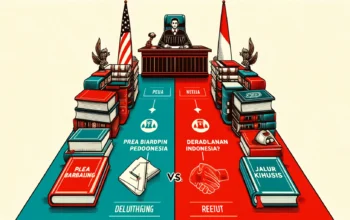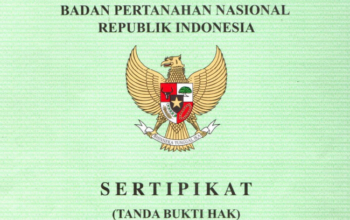Legal Literacy – Bullying has recently become a rampant issue in Indonesia. Not only in the community, the act of disturbing and hurting others is also massive in the scope of Islamic education.
This article discusses the phenomenon of bullying that often occurs in Islamic boarding schools and how Islamic law and criminal law view these cases.
Knowing Bullying Behavior
Bullying can be defined as intentional violence or bullying by a stronger person or group.
Juridically, acts of violence are described in Article 1 point 16 of Law Number 35 of 2014, which is any act committed against a child that causes physical, psychological, sexual, and/or neglect, including threats to commit acts, coercion, or unlawful deprivation of liberty.
Bullying incidents can occur in the home or family environment, school, and the wider community. Bullies are generally those who are popular figures and have power in the area or school. The victims are usually junior, less confident, shy, quiet, and those who feel weak.
Types of Bullying
Antonius P.S. Wibowo through his book entitled “Application of Criminal Law in Handling Bullying in Schools” divides bullying into 3 types, namely:
(1) Physical Bullying
This type of bullying is characterized by physical touch between the perpetrator and the victim and can be seen with the naked eye.
Physical bullying generally includes pushing, kicking, pinching, grabbing, slapping, scratching, hurting with objects, blackmailing, damaging other people’s property, and so on.
(2) Verbal Bullying
This type of bullying is characterized by abusive or unkind behavior towards someone through words or speech. This type of bullying can hurt others through words alone.
Some behaviors that include verbal bullying include yelling, threatening, insulting, berating, demeaning, throwing harsh or dirty words at the victim, intimidating, spreading gossip, calling the victim names or terms that hurt the victim, and so on.
(3) Psychological Bullying
This type of bullying is divided into 2 categories, namely direct non-verbal bullying and indirect non-verbal bullying .
- Direct Non-Verbal
This type of bullying is characterized by a cynical and threatening look or facial expression towards the victim. In these cases, physical and verbal bullying are common.
- Indirect Non Verbal
This type of bullying is characterized by silencing the victim, excluding, ignoring, slandering, terrorizing, scaring, and mocking through social media.
In addition to the bullying mentioned above, there are 2 other types of bullying proposed by McCulloch and Barbara, namely:
(1) Social Bullying
This type of bullying is defined as social bullying, such as telling others not to be friends with someone, spreading false rumors, or embarrassing others in public.
(2) Cyberbullying
This type of bullying is defined as any action that utilizes communication and information technology to encourage deliberate and/or continuous hostility by individuals or groups with the aim of harming others.
The Phenomenon of Bullying in Islamic Boarding Schools
Pesantren as a religious-based educational institution, in studying, exploring, understanding, appreciating, and applying Islamic values must focus or emphasize behavior or morals in accordance with Islamic values as a benchmark for behavior.
According to data from the SAPA 129 service, cases of bullying in educational environments, both in schools and pesantren in 2023, reached 49 cases with 63 victims.
In early 2024, on February 23, the death of Bintang Balqis Maulana (14) opened the door to bullying cases at Pondok Pesantren. He is a student of Al-Hanifiyyah Islamic Boarding School in Mojo, Kediri Regency, East Java. On his body, there were a number of bruises, cigarette burns on his legs, neck wounds, a broken nose, and chest wounds.
Sadly, the pesantren claimed that Bintang’s death was caused by falling in the bathroom. In fact, the caretaker of the boarding school was unaware of the tragedy that befell his students. This shows how little supervision is done by the pesantren.
Bullying in boarding schools has become a routine that always happens. Throughout 2023, there were various cases of bullying within the pesantren. In December 2023, a student with the initials H (18) from the Husnul Khotimah Islamic Boarding School was killed by his friend.
A similar case also occurred in September 2023, a student at an Islamic boarding school in Temanggung with the initials MNF (15) died as a result of bullying. Meanwhile, in March 2023, a 16-year-old student at a boarding school in Bangkalan, Madura died with serious bruises on his back, arms and chest.
Factors of Bullying in Islamic Boarding Schools
There are several factors that cause rampant bullying in the pesantren environment, such as:
(1) Seniority
Students who have been in boarding school for a long time usually feel more powerful than new students. This also applies to students with older ages towards younger students.
(2) Away from Parental Supervision
Santri come from various regions with different cultures and customs. Students who do not have good socialization skills will have difficulty adapting to the new environment.
(3) The number of rules set in the pesantren
This is sometimes justur considered rigid and less effective in regulating the negative behavior of the santri. Although these rules aim to improve santri discipline, they are often perceived as restraints.
(4) No Firm Action from the Boarding School
The lack of supervision and guidance of students opens up opportunities for repeated bullying in pesantren.
(5) The existence of a “Disposal Site” label
Santri in boarding schools are usually based on the will of their parents, not according to their own consciousness. In the community, pesantren are often labeled as “rehabilitation places” or “dumping grounds” for children who have deviant actions. Instead of receiving guidance, students with poor morals often cause trouble and misbehave in the pesantren.
The Impact of Bullying in Islamic Boarding Schools
Bullying has a very negative impact on victims as it can harm them both physically and emotionally. Emotionally, victims will experience anxiety, restlessness, depression, sadness, discomfort, and loss of motivation. Repeated exposure to these conditions can affect self-confidence, self-esteem and learning achievement.
Students who are victims of bullying will not feel at home studying at the pesantren, have no enthusiasm for learning, and will try to leave the pesantren for various reasons.
In more detail, Carter and Spencer describe some of the effects of bullying on a person, namely:
- Victims of bullying become stressed, depressed, hate the bully, seek revenge, drop out of school, feel lethargic, embarrassed, depressed, threatened, and self-harm.
- The self-image of victims of bullying becomes more negative because they feel they are not accepted by their friends.
- Aggression often leads to criminal behavior or actions.
- Become the next bully.
- Psychiatric disorders (such as anxiety and loneliness).
- The victim feels useless or inferior.
- Dislikes social environment.
- Permanent physical disability and even death.
- Emotional disturbance leading to personality disorder.
- Suicidal thoughts arose.
Bullying Handling Efforts in Islamic Boarding Schools
There are several efforts that can be made by Islamic boarding schools in dealing with bullying cases, among others:
- Equipping students with positive activities, namely activities that foster a sense of togetherness and cohesiveness between students.
- Equipping students to be able to overcome uncomfortable situations that can arise in the pesantren environment.
- Empower students to defend themselves, avoid becoming victims of violence,
report the violence they witness, and seek help. - Reduce or eliminate the distance between old and new students by providing competitive team field activities.
- Establish a supervisory committee to monitor the extent to which bullying can be prevented.
- Provide counseling and mentoring services to protect against bullying.
Bullying in Islamic Law
Islam strictly prohibits bullying in the Qur’an Surah Al-Hujurat [49] verse 11.
يٰۤاَيُّهَا الَّذِيۡنَ اٰمَنُوۡا لَا يَسۡخَرۡ قَوۡمٌ مِّنۡ قَوۡمٍ عَسٰٓى اَنۡ يَّكُوۡنُوۡا خَيۡرًا مِّنۡهُمۡ وَلَا نِسَآءٌ مِّنۡ نِّسَآءٍ عَسٰٓى اَنۡ يَّكُنَّ خَيۡرًا مِّنۡهُنَّۚ وَلَا تَلۡمِزُوۡۤا اَنۡفُسَكُمۡ وَلَا تَنَابَزُوۡا بِالۡاَلۡقَابِؕ بِئۡسَ الِاسۡمُ الۡفُسُوۡقُ بَعۡدَ الۡاِيۡمَانِ ۚ وَمَنۡ لَّمۡ يَتُبۡ فَاُولٰٓٮِٕكَ هُمُ الظّٰلِمُوۡنَ
“O you who believe! Let not one people make fun of another people (for) they may be better than the one who makes fun of them, and let not women make fun of other women (for) they may be better than the one who makes fun of them). Do not insult one another and do not call one another by bad names. The worst of calls is that which is bad (ungodly) after believing. And whoever does not repent, then they are the wrongdoers.” (Al-Hujurat [49]: 11).
Referring to the explanation of the book of Tafsir Al-Maraghi, the above verse was revealed regarding the reprimand for the ridicule and bullying carried out by the Banu Tamim to the poor companions of the prophet.
Based on the explanation above, it can be concluded that humans have the same degree in the eyes of Allah SWT, so bullying is not allowed.
Bullying in Criminal Law
Bullying is an act of child abuse. Therefore, based on the Child Protection Law and its amendments, bullying is included as a criminal offense. Both physical and verbal bullying are regulated in Article 76C of Law 35/2014 as follows:
Every person is prohibited from placing, allowing, committing, ordering to commit, or participating in violence against children.
Furthermore, perpetrators who violate this article will be subject to sanctions in accordance with Article 80 of Law 35/2014, namely:
- Any person who violates the provisions of Article 76C of Law 35/2014 shall be sentenced to a maximum imprisonment of 3 years and 6 months and/or a maximum fine of IDR 72 million.
- If the child is seriously injured, the perpetrator is sentenced to imprisonment for a maximum of 5 years and/or a maximum fine of Rp100 million.
- If the child dies, the perpetrator is sentenced to imprisonment for a maximum of 15 years and/or a maximum fine of Rp3 billion.
- The punishment shall be increased by one third of the provisions in paragraphs (1), (2) and (3) if the offender is a parent.
That is the description of the phenomenon of bullying that often occurs in Islamic boarding schools and the perspective of Islamic law and criminal law in taking action against bullying behavior.






